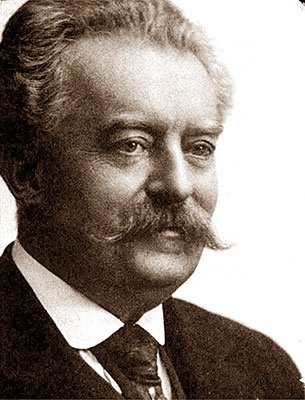Chamber concert celebrates Longy School’s 100 years with a French accent
The Boston institution long known as the Longy School of Music–now bearing the post-merger handle Longy School of Music of Bard College–began celebrating its 100th anniversary Friday night in the school’s Pickman Hall. The festivities kicked off, not with a star-studded gala but with an informal evening of French and Franco-American music, featuring members of the Longy School family, past and present.
No, the composers Fauré, Saint-Saëns and Debussy did not teach at Longy, but Georges Longy and Charles Martin Loeffler were the school’s founder and first faculty member respectively, and judging from their works on Friday’s program, composers to be reckoned with as well.
The concert, titled “1915: Paris and Boston,” was the first in a weekend series of five events dubbed SeptemberFest, which, despite its Germanic name, will continue to present classical and popular music from France and America in the early 20th century.
Friday’s celebration began with video congratulations to the school from leaders of arts institutions in Boston and beyond, followed by a spoken reflection by two Longy students on the long-ago era when a Beethoven concert could jostle with a Red Sox World Series win for top billing in the Boston Globe.
The evening’s performers were all Longy faculty (except as indicated below), displaying their accomplishment on most of the typical chamber music instruments, excepting cello but including saxophone and percussion.
Soprano Jayne West led off with sweet-toned renditions of songs about moonlight by the above-mentioned French composers, accompanied by pianist Robert Merfeld, with the novelty of lowered stage lights and projections of impressionistic night scenes behind the performers.
Fortunately, following this performance, both the stage lighting and the projection screen went up for the rest of the evening, and the subsequent works by Debussy, Loeffler, and Longy wove their magic in the customary way.
Magic of a digital kind wowed the audience as three young women, all Longy students, came onstage for a kind of “cutting contest” with Debussy’s wonderfully imaginative and gnarly piano etudes. Each took the piano bench in turn, spinning out the French master’s dazzling figurations while the other two watched from their seats onstage.
The three pianists responded to the four etudes (happily, the gifted undergraduate Jiaoyao Shen was allotted two) with technical mastery and verve, revealing three distinct musical personalities: Shen with a finely nuanced leggiero style, Junling Lu with a full and pearly tone, Yijuan Geng with a soft-edged sound and sensitive rubato.
The program was blessed with a generous helping of music by Loeffler, the German-born Francophile who became a U.S. citizen and served as second concertmaster of the Boston Symphony Orchestra for 21 years. His episodic Ballade Carnavalesque for winds and piano, as vigorously performed by flutist Marco Granados, oboist (and Longy alumna) Miri Kudo, saxophonist Ken Radnofsky, bassoonist Adrian Morejon, and pianist Libor Dudas, oddly married a rippling, Fauré-like texture with a rather thick low-winds sound.
Loeffler was back after intermission with his Quatre Poèmes, Op. 5, for soprano, viola, and piano. Karyl Ryczek sang the nicely contrasted set with a round tone and sensitive projection of the French text—a good thing, since printed texts and translations weren’t provided at this concert. Guest violist Masumi Per Rostad subtly intertwined his part with the singer’s, and Wayman Chin provided energetic support at the piano.
By happy coincidence, the program’s closing piece, Rapsodie for mixed ensemble by Georges Longy, was based on a theme that strongly resembles one later composed by Nino Rota for his score for The Godfather. M. Longy certainly loomed large over musical Boston with his performing ensembles, his music clubs, and of course his school.
This piece, like Loeffler’s Ballade, was composed for Elise Boyer Hall, a Boston socialite, music patron, and enthusiastic player of the saxophone. The ominous sound of low winds was heard again, made more so with double bass and rumbles on timpani, with only an angelic harp to lighten the scene as saxophonist Radnofsky intoned his meditation.
Radnofsky’s passionate swells and startling runs made a deep impression, sensitively supported by the ensemble, conducted by Libor Dudas and consisting of clarinetists Jonathan Cohler and Jorge Montilla, bassoonist Morejon, double-bassist Pascale Delache-Feldman, harpist Franziska Huhn, and percussionist Sylvie Zakarian.
Posted in Performances





